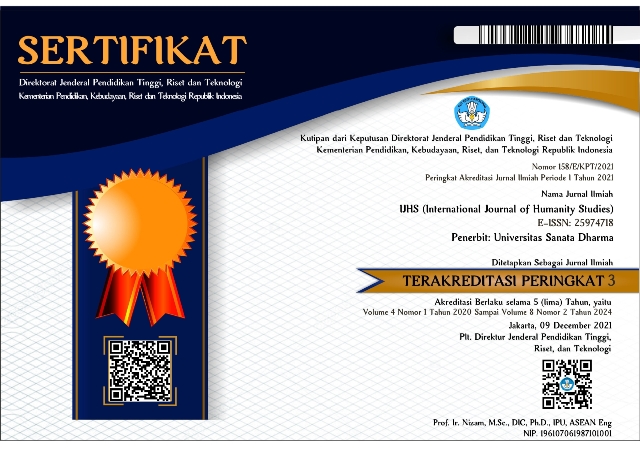MADURA LANGUAGE VARIATIONS IN CHILDREN AND ADULTS IN MANDURO VILLAGE SEEN FROM PHONOLOGICAL CHANGE AND ITS RELATIONSHIP WITH LANGUAGE CHANGE AND ETHNIC IDENTITY
Abstract
Keywords
Full Text:
PDFReferences
Allan, K. (2016). What is linguistics?. In The Routledge Handbook of Linguistics (Ed. Keith, A.). New York: Routledge.
Bisang, W. (2016). Linguistic change in grammar. The Routledge Handbook of linguistics, 366-384
Chamber, J. K & Trugdill, P. (1998). Dialectology: Second edition. United Kingdom: Cambridge Textbooks in Linguistics.
Dewi, F. R. (2010). Geografi dialek bahasa madura di daerah pesisir Probolinggo. Jurnal Artikulasi, 9(1).
Dewi, Fitriana, et al. (2017). Kajian dialektologi bahasa madura dialek bangkalan. Jurnal Fonema, 2(2), 60-77.
Fredrik. B. (1969). Ethnic Groups and Boundaries: The Social Organization of Cultural Difference; Eric Wolf 1982 Europe an The People.
Hakim, L. (2013). Dialek Geografis Bahasa Madura. Universitas Muhammadiyah Malang. Skripsi
Haryono, A. (2012). Perubahan dan perkembangan bahasa: Tinjauan historis dan sosiolinguistik. Jember: Universitas Jember.
Hasanah, E., dkk. (2015). Analisis komparatif antara bahasa jawa dialek Jember dan bahasa jawa standar. Jurnal Publika Budaya. 1(1), 1-15.
Hoffer, B. L. (2002). Language borrowing and language diffusion: An overview. Interculturan Communication Studies XI:4. Trinity University.
Holmes, J. (2008). An introduction to sociolinguistics: Third edition. England: Pearson Longman.
Laksono, K. (2009). Dialektologi. Surabaya: Unesa University Press.
Mahsun. Dialektologi Diakronis: Sebuah Pengantar. Yogyakarta: Gadjah Mada University Press.
Marsono. (1986). Fonetik. Yogyakarta: Gadjah Mada University Press.
Meyerhoff, M. (2006). Introducing Sociolinguistics. New York: Routledge.
Muslich, M. (2011). Fonolog bahasa Indonesia: Tinjauan deskriptif sistem bunyi bahasa Indonesia. Jakarta: Bumi Aksara.
Permadi, A. D. (2013). Deskripsi konstruksi sosial dalam membentuk identitas simbolik oreng manduro. Jurnal Antro Unair DotNet, 2(1).
Poedjosoedarmo, S. (2008). Perubahan Bahasa. Disajikan dalam Seminar Ceramah Ilmiah Linguistik Pusat Kajian Melayu. Surakarta: Universitas Sebelas Maret.
Rusiandi, A. (2015). Klasifikasi Dialogis Bahasa Madura secara Kuantitatif di Pulau Madura, Bawean, Sapudi, dan Kangean.Yogyakarta. Universitas Gajah Mada. Tesis.
Sankoff, G. (2004). Linguistic Outcomes of Language Contact dalam The Handbook of Language Variation and Change. Maiden: Blackwell Publishing.
Sasangka, S. S. T. W. (2011). Bunyi-bunyi distingtif bahasa Jawa. Yogyakarta: Elmatera Publishing.
Savitri, A. D. & Wahyu, N. H. (2015). Pergeseran Bahasa Madura pada Masyarakat Desa Manduro Kecamatan Kabuh Kabupaten Jombang. Universitas Negeri Surabaya.
Sofyan, A. (2010). Fonologi bahasa Indonesia. Jurnal Humaniora. 22(2), 07218. Fakultas Sastra, Universitas Jember.
Song, J. J. (2016). Linguistic typology and language universals. In The Routledge Handbook of Linguistics (Ed. Keith Allan). New York: Routledge.
Suci, F. W. (2016). Perbandingan leksikon bahasa Jawa dan bahasa Madura. Universitas Negeri Semarang. Skripsi.
Verhaar, J. W. M. (2004). Asas-asas linguistik umum. Yogyakarta: Gadjah Mada University Press.
Wijayanti, E. D. (2016). Variasi dialek bahasa Bawean di wilayah Pulau Bawean kabupatten Gresik: Kajian dialektologi. Universitas Airlangga Surabaya. Skripsi.
Wolfram, W. & Fasold, R. W. (1974). The study of social dialects in American English. USA: Prentice-Hall, Inc.
DOI: https://doi.org/10.24071/ijhs.v2i2.1763
Article Metrics
Abstract view : 3577 timesPDF view: 1729 times
Refbacks
- There are currently no refbacks.
Copyright (c) 2019 Ety Setiawati, Wahyu Widodo, Warsiman Warsiman, Sony Sukmawan, Dany Ardhian
Indexed and abstracted in:
IJHS Sinta 3 Certificate (S3 = Level 3)
International Journal of Humanity Studies (IJHS) has been nationally accredited Sinta 3 by the Ministry of Education, Culture, Research and Technology of the Republic of Indonesia based on the decree No. Surat Keputusan 158/E/KPT/2021. Validity for 5 years: Vol 4 No 1, 2020 till Vol 8 No 2, 2024

This work is licensed under CC BY-SA.
Creative Commons Attribution-ShareAlike 4.0 International License.
p-ISSN: 2597-470X (since 31 August 2017); e-ISSN: 2597-4718 (since 31 August 2017)
International Journal of Humanity Studies (IJHS) is a scientific journal in English published twice a year, namely in September and March, by Sanata Dharma University, Yogyakarta, Indonesia.
Note: The opinions expressed in this publication are those of the authors. They do not purport to reflect the opinions or views of the editorial team or publishers.

















